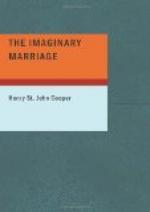Artists were Mrs. Bonner’s usual customers. The cottage was old, half-timbered and hipped-roofed. The roof was clad with Sussex stone, lichen-covered, and a feast of colour from grey and vivid yellow to the most tender green. Mrs. Bonner herself was a comfortable body, built on ample and generous lines, a born house manager, a born cook, and of a cleanliness that she herself described as “scrutinous.”
So Hugh, casting about for a retreat, had happened on Mrs. Bonner’s cottage and had installed himself here—for how long he knew not, for what purpose he scarcely even guessed at. Yet here he was.
Mrs. Bonner had seen Philip Slotman, as she saw most things and people that at one time or another passed within range of her windows.
She recognised him from Hugh’s description.
“It would be about best part of a fortnight ago,” she said. “He had shammy leather gloves on, and was in Hickman’s cab. Hickman waited for him at the hall gates and then took him back.”
“And he’s not been here since?”
“I fancy, but I ain’t sure, that I did see him one day in a car,” said Mrs. Bonner; “but I couldn’t swear to it.”
Twice he had seen “Her” from the window of Mrs. Bonner’s little cottage, once a mere glimpse as she had flashed by in a car; the other time she had been afoot, walking and alone. He had gazed on the slim grace of her figure, himself hidden behind Mrs. Bonner’s spotless white lace curtains. He had watched her, his soul in his eyes, the woman he loved and who was not for him, could never be for him now, and there fell upon him a sense of desolation, of loneliness, of utter hopelessness.
Three days had passed since his coming to Starden. He had seen Joan twice, he had seen the man she was to marry. Once he had caught a glimpse of John Everard hurrying to Starden Hall in his little car, he himself had been standing by Mrs. Bonner’s gate. Everard had turned his head and glanced at him, with that curiosity about strangers that all dwellers in rustic places feel.
“An artist, I suppose,” Johnny thought as he drove on.
Hugh watched him down the road; he had seen Everard’s glance at him, and had summed him up. The man was just what he would have imagined, a man of his own stamp, no Adonis—just an ordinary, healthy, clean-living Englishman.
“I rather like the look of him,” thought Hugh. “He seems all right.” And then he smiled at his thoughts a trifle bitterly. “By every right on earth I ought to hate him.”
Johnny drove his small car to the doors of the Hall.
“Joan,” he said, “come out. Come out for a spin—the car’s running finely to-day. Come out, and we’ll go and have lunch at Langbourne or somewhere. What do you say?” His face was eager. “You know,” he added, “you have never been out with me in my car yet.”
“If you would like me to.”
“Go and get ready then, and I’ll tell Helen,” he said. “We shan’t be back to lunch.”




